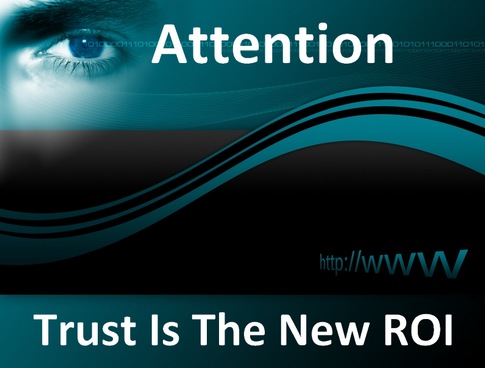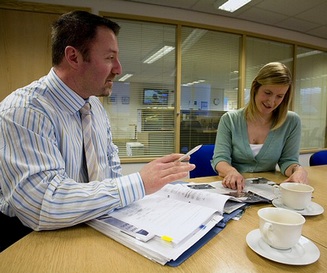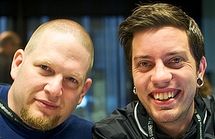 Photo credit: Phecsone
With the growing amount of blog-based independent news, social media, real-time news streams, live collaboration tools, video and podcasts, Internet users are increasingly on the run. At the pace of a few minutes for each, people are jumping from conversations to entertainment to creating content and sharing it with no pause or break. Their attention is now the scarce resource, not the content, tools or services they are interacting with.
That's why the ability to grab and hold someone attention for an extended period of time has become more valuable than gold. Getting deep and extended customer attention is going to be one the most valuable asset a company can build, no matter what article or product it sells.
This is why "attention" is the new ROI.
But how do you conquer such scarce and in-demand attention?
There are many ways. Start creating a two-way relationship with your audience. Make customers your friends. Establish a sincere dialogue with them before you make any sale. Provide advice. Share good information and resources with them. Teach them something good. And so on.
As a matter of fact, it is the whole concept of "selling" that needs to be approached in a different way.
People are suspicious of marketing. If they see that you are actively trying to sell them something they will resist your offers. Direct marketing strategies are also useless in this new trust economy and institutional info has become the symbol of fake, untrustable company communication.
Customers want friendly, sincere, credible and unpartial suggestions, passionate recommendations by someone who cares about their needs and not only about extracting money from them.
Start building a following of passionate, true fans and followers who love your advice, suggestions and ideas. Let them be your best marketing agents. Help them realize their dreams and they will in turn do the best word-of-mouth marketing job you could ever buy, for free.
If you leverage your character, authority and expertise, without coming down as the "best", the only one, and all that classical marketing crap, but relate to people in a way that puts them and satisfying their needs as your first objective, they will start to like you more than they ever did. They will self-elect themselves as your brand-ambassadors and will spontaneously promote and give advice about your product at zero cost to you. Be so good and honest to make them trust your advice and the sale will come, guaranteed.
In today's featured contribution, Chris Brogan and Julien Smith explain why the trust economy is on the rise and why attention is indeed the new ROI.
Here all the details:
Photo credit: Phecsone
With the growing amount of blog-based independent news, social media, real-time news streams, live collaboration tools, video and podcasts, Internet users are increasingly on the run. At the pace of a few minutes for each, people are jumping from conversations to entertainment to creating content and sharing it with no pause or break. Their attention is now the scarce resource, not the content, tools or services they are interacting with.
That's why the ability to grab and hold someone attention for an extended period of time has become more valuable than gold. Getting deep and extended customer attention is going to be one the most valuable asset a company can build, no matter what article or product it sells.
This is why "attention" is the new ROI.
But how do you conquer such scarce and in-demand attention?
There are many ways. Start creating a two-way relationship with your audience. Make customers your friends. Establish a sincere dialogue with them before you make any sale. Provide advice. Share good information and resources with them. Teach them something good. And so on.
As a matter of fact, it is the whole concept of "selling" that needs to be approached in a different way.
People are suspicious of marketing. If they see that you are actively trying to sell them something they will resist your offers. Direct marketing strategies are also useless in this new trust economy and institutional info has become the symbol of fake, untrustable company communication.
Customers want friendly, sincere, credible and unpartial suggestions, passionate recommendations by someone who cares about their needs and not only about extracting money from them.
Start building a following of passionate, true fans and followers who love your advice, suggestions and ideas. Let them be your best marketing agents. Help them realize their dreams and they will in turn do the best word-of-mouth marketing job you could ever buy, for free.
If you leverage your character, authority and expertise, without coming down as the "best", the only one, and all that classical marketing crap, but relate to people in a way that puts them and satisfying their needs as your first objective, they will start to like you more than they ever did. They will self-elect themselves as your brand-ambassadors and will spontaneously promote and give advice about your product at zero cost to you. Be so good and honest to make them trust your advice and the sale will come, guaranteed.
In today's featured contribution, Chris Brogan and Julien Smith explain why the trust economy is on the rise and why attention is indeed the new ROI.
Here all the details:
Trust Economies: Investigations into the New ROI of the Web
by Chris Brogan and Julien SmithIf You Build It, They Won’t Come
 What happened to the early days? You built a baseball stadium, a store, a web app, and people flocked to it.
Now what? We are suspicious of marketing. We don’t trust strangers as willingly.
Buzz is suspect. It can be bought. Instead, consumers and business people alike are looking towards trust. We want our friends to tell us it’s good. We want someone we know to say we should look into it.
Marketing spend might start at awareness, but in the trust economy communities are king, and ROI stands for Return on Influence.
This affects disruptive products or services more than ever. You have a new razor? Mine seems just fine. Your new web application is a great time saver? I’m over here instead because my friends use this web app.
Marketing and sales people, here is your notice; you’re fired unless you start investing in the trust economy.
Somewhere into the 1990s, the sense that what someone tells you about a product or service is “true” went downhill fast. We became skeptical about everything.
The more society attempted to “be real,” the more they launched deceptions that were quickly overturned.
Some innocent people videotaping their RV trip across America suddenly became “that Walmart scheme.” The lonely girl in her bedroom became a production project. The “try out Vista on ferrari laptops” turned into a controversy. Even Nikon’s D80 campaign went through some blogosphere controversy related to whether giving someone a product for evaluation was too influencing on future coverage.
What do these all have in common? Trust. All of these situations came from unknowns, drove awareness briefly, were uncovered to be something different than perceived, and floated like a lead balloon.
What happened to the early days? You built a baseball stadium, a store, a web app, and people flocked to it.
Now what? We are suspicious of marketing. We don’t trust strangers as willingly.
Buzz is suspect. It can be bought. Instead, consumers and business people alike are looking towards trust. We want our friends to tell us it’s good. We want someone we know to say we should look into it.
Marketing spend might start at awareness, but in the trust economy communities are king, and ROI stands for Return on Influence.
This affects disruptive products or services more than ever. You have a new razor? Mine seems just fine. Your new web application is a great time saver? I’m over here instead because my friends use this web app.
Marketing and sales people, here is your notice; you’re fired unless you start investing in the trust economy.
Somewhere into the 1990s, the sense that what someone tells you about a product or service is “true” went downhill fast. We became skeptical about everything.
The more society attempted to “be real,” the more they launched deceptions that were quickly overturned.
Some innocent people videotaping their RV trip across America suddenly became “that Walmart scheme.” The lonely girl in her bedroom became a production project. The “try out Vista on ferrari laptops” turned into a controversy. Even Nikon’s D80 campaign went through some blogosphere controversy related to whether giving someone a product for evaluation was too influencing on future coverage.
What do these all have in common? Trust. All of these situations came from unknowns, drove awareness briefly, were uncovered to be something different than perceived, and floated like a lead balloon.
Stop Thinking Sales. Start Thinking Relationships
 The relationship comes before the sale, not the other way around.
Make your customers friends. Not in an ushy-gooshy “let’s all go out and get tattoos” way. But, care about these people. Treat them like what they are - your gold.
In marketplaces where a simple sale is no longer simple, building trust today, through establishing and cultivating relationships, is at the core of the experience. This isn’t “trust so you can make a sale.” Rather, build trust and establish a relationship, period - for the sake of that trust and relationship alone.
The sale is neither here nor there until the relationship is established.
The problem when you’re faking that relationship - like, after you make the sale - is that the friendly emails suddenly stop. When the relationship is fake, the client detects that. In fact, we all do.
But if the relationship is real, you will do the best for your client. When that happens, you’ll begin to see all those negative responses vanish. Why? You just became a friend, and friends look out for one another. A short-term sales person or marketer sees only the number they’ve been given to hit.
While numbers are important, and while bosses have quotas in mind, it’s possible that building a stronger relationship will drive more recurring sales and referrals and further adoption. Consider it tending a farm of potential versus hunting for the short term.
The relationship comes before the sale, not the other way around.
Make your customers friends. Not in an ushy-gooshy “let’s all go out and get tattoos” way. But, care about these people. Treat them like what they are - your gold.
In marketplaces where a simple sale is no longer simple, building trust today, through establishing and cultivating relationships, is at the core of the experience. This isn’t “trust so you can make a sale.” Rather, build trust and establish a relationship, period - for the sake of that trust and relationship alone.
The sale is neither here nor there until the relationship is established.
The problem when you’re faking that relationship - like, after you make the sale - is that the friendly emails suddenly stop. When the relationship is fake, the client detects that. In fact, we all do.
But if the relationship is real, you will do the best for your client. When that happens, you’ll begin to see all those negative responses vanish. Why? You just became a friend, and friends look out for one another. A short-term sales person or marketer sees only the number they’ve been given to hit.
While numbers are important, and while bosses have quotas in mind, it’s possible that building a stronger relationship will drive more recurring sales and referrals and further adoption. Consider it tending a farm of potential versus hunting for the short term.
Return On Influence: The New ROI
 If marketing and sales requires a new relationship, the best returns come from those with the most influence over others.
Your friend the photography buff influences her photowalking club. Your brother’s friend who works at the sports bar has a line on which new beers are good, and people trust him and value his opinion.
Learn the skill of identifying the influencers, and develop those relationships. And for the bonus round, learn how the online world makes this even easier via social networking. With luck, this can occur organically.
The goal isn’t to roam around on social networks hand-picking friends. Instead, get involved with communities of interest, and grow these experiences and relationships BEFORE you need them. And remember, if you are building relationships strictly for business, they will have less impact. That’s because being part of relationships is what real people do.
When you enter a market, be a real person. Act like one, care like one, and feel like one. Those subtle signals, verbal and non-verbal, help people figure out how to react to you and see whether they should hand you any of their attention.
Understand that the digital natives know who’s there to market and sell, and who’s there to build relationships. We (the digital natives) know you’re new. We often can tell really quickly that you’re hoping to introduce your product or service to the conversation. Some of us will even be more responsive to this than others. But, then there will be many who will cry foul the moment you cross the line into pure sales or marketing.
Remember, the trust economy is a conversation / relationship environment. We know you’ve got a job to do, but there are lots of people who prefer you do it elsewhere if you’re going to use traditional “bomb” marketing and sales efforts, versus “hand to hand” relationship building.
If marketing and sales requires a new relationship, the best returns come from those with the most influence over others.
Your friend the photography buff influences her photowalking club. Your brother’s friend who works at the sports bar has a line on which new beers are good, and people trust him and value his opinion.
Learn the skill of identifying the influencers, and develop those relationships. And for the bonus round, learn how the online world makes this even easier via social networking. With luck, this can occur organically.
The goal isn’t to roam around on social networks hand-picking friends. Instead, get involved with communities of interest, and grow these experiences and relationships BEFORE you need them. And remember, if you are building relationships strictly for business, they will have less impact. That’s because being part of relationships is what real people do.
When you enter a market, be a real person. Act like one, care like one, and feel like one. Those subtle signals, verbal and non-verbal, help people figure out how to react to you and see whether they should hand you any of their attention.
Understand that the digital natives know who’s there to market and sell, and who’s there to build relationships. We (the digital natives) know you’re new. We often can tell really quickly that you’re hoping to introduce your product or service to the conversation. Some of us will even be more responsive to this than others. But, then there will be many who will cry foul the moment you cross the line into pure sales or marketing.
Remember, the trust economy is a conversation / relationship environment. We know you’ve got a job to do, but there are lots of people who prefer you do it elsewhere if you’re going to use traditional “bomb” marketing and sales efforts, versus “hand to hand” relationship building.
Business Is Personal: The Blending Of Social Constructs
 The edges between work and social life are blurring. people are shifting their social networks into their work networks and vice versa - business associates and childhood friends, side by side.
Business has invaded Facebook. Creative talent seekers are scouring MySpace, Flickr, and YouTube for their next star. Do you “friend” (befriend?) your boss on Facebook? do you send Twitter messages to your sales rep? You do now.
Social software permits rich interactions. What you feed into the system becomes another point we can use to connect.
We prefer to buy from people that are like us. You like Batman movies? Me too! That may not always be enough to move a sale, but it shows your human dimensions, and in this wired world of digital communities and deep long-tail niches, humanity-over-IP is the protocol.
The edges between work and social life are blurring. people are shifting their social networks into their work networks and vice versa - business associates and childhood friends, side by side.
Business has invaded Facebook. Creative talent seekers are scouring MySpace, Flickr, and YouTube for their next star. Do you “friend” (befriend?) your boss on Facebook? do you send Twitter messages to your sales rep? You do now.
Social software permits rich interactions. What you feed into the system becomes another point we can use to connect.
We prefer to buy from people that are like us. You like Batman movies? Me too! That may not always be enough to move a sale, but it shows your human dimensions, and in this wired world of digital communities and deep long-tail niches, humanity-over-IP is the protocol.
Don't Be That Guy
 There’s networking and relationship-building for business, and then there’s sales-disguised-as-networking. Don’t confuse the two.
“That guy” talks about his product incessantly. His product sent out a really great tee shirt to fans. His product is beating the doors off the other guy. You should really get on over to his product’s website and look at the updates.
Don’t be that guy. Talk to people because you like the people. Choose people that have something to do with your product, and then, ask them about them. Make the person you’re speaking to a rock star - care about them, the projects they have, and come to see it from THEIR point of view. You’ll find yourself excited about their successes, and then they’ll be happy about yours, too.
Consider this a “trust Stock market,” and the marketplace is really bearish on “that guy” today.
There’s networking and relationship-building for business, and then there’s sales-disguised-as-networking. Don’t confuse the two.
“That guy” talks about his product incessantly. His product sent out a really great tee shirt to fans. His product is beating the doors off the other guy. You should really get on over to his product’s website and look at the updates.
Don’t be that guy. Talk to people because you like the people. Choose people that have something to do with your product, and then, ask them about them. Make the person you’re speaking to a rock star - care about them, the projects they have, and come to see it from THEIR point of view. You’ll find yourself excited about their successes, and then they’ll be happy about yours, too.
Consider this a “trust Stock market,” and the marketplace is really bearish on “that guy” today.
Attention As Currency
 Ask anyone if they have enough time in a day. Ask them if they want more words to look at, more decisions to make, more websites to navigate. Our attention is becoming more valuable than originally calculated.
Web hits, magazine subscribers, and TV viewers can’t be counted accurately any longer, because we’re not paying as much attention!
Here’s a magic question: “What has your attention right now?” And if you seek to influence that answer, you are barking up the right tree.
If you answered that your attention is on this manifesto, don’t lie: The truth is that your attention is on this manifesto, your email, possibly the fight with your wife this morning, and how you were cut off during rush hour right before work.
Admit it: Attention is scarce - more valuable than cash and rarer than gold. When you get some, embrace it and find out how to get more. Then lather, rinse, repeat.
Think about it like this: In a time of starvation, people hoard their food. these days, we are starved for time. That means it’s harder to get someone to try your service, or read your blog, or even have a conversation with you - all that takes attention we don’t even have.
You solve this by creating value before you need it. that imbalance helps people realize what you’ve given them, and it makes them want to give you more of their attention. If you use that wisely, you’re well on your way. But the challenge comes in knowing how not to squander or over-use the attention you’re given.
If you’re forever asking for the spotlight, people will grow tired of this quickly. Just like with any economy, there are deposits of your time and attention, and then there are withdrawals when you seek out someone else’s. So pay close attention to your balance statements.
Ask anyone if they have enough time in a day. Ask them if they want more words to look at, more decisions to make, more websites to navigate. Our attention is becoming more valuable than originally calculated.
Web hits, magazine subscribers, and TV viewers can’t be counted accurately any longer, because we’re not paying as much attention!
Here’s a magic question: “What has your attention right now?” And if you seek to influence that answer, you are barking up the right tree.
If you answered that your attention is on this manifesto, don’t lie: The truth is that your attention is on this manifesto, your email, possibly the fight with your wife this morning, and how you were cut off during rush hour right before work.
Admit it: Attention is scarce - more valuable than cash and rarer than gold. When you get some, embrace it and find out how to get more. Then lather, rinse, repeat.
Think about it like this: In a time of starvation, people hoard their food. these days, we are starved for time. That means it’s harder to get someone to try your service, or read your blog, or even have a conversation with you - all that takes attention we don’t even have.
You solve this by creating value before you need it. that imbalance helps people realize what you’ve given them, and it makes them want to give you more of their attention. If you use that wisely, you’re well on your way. But the challenge comes in knowing how not to squander or over-use the attention you’re given.
If you’re forever asking for the spotlight, people will grow tired of this quickly. Just like with any economy, there are deposits of your time and attention, and then there are withdrawals when you seek out someone else’s. So pay close attention to your balance statements.
Friends As Spokespeople
 Look at any glossy print advertisement for a new product. Is there a smiling person holding that product? Who is that person? Do you trust celebrities to tell you what’s good? Why should a testimonial from someone you don’t know sell you, especially when you KNOW they were paid?
Now, what if your friend told you about something they love - no money changing hands, and without any incentive? What if your friend simply really loved a product or service? Wouldn’t you feel compelled to follow their suggestion? Now turn that equation around. Find LOVERS of your products and services and equip them to evangelize.
Keep it above board, and make disclosure the keyword that keeps it all honest. If you do this right, the next thing you know, you have a volunteer army.
Look at any glossy print advertisement for a new product. Is there a smiling person holding that product? Who is that person? Do you trust celebrities to tell you what’s good? Why should a testimonial from someone you don’t know sell you, especially when you KNOW they were paid?
Now, what if your friend told you about something they love - no money changing hands, and without any incentive? What if your friend simply really loved a product or service? Wouldn’t you feel compelled to follow their suggestion? Now turn that equation around. Find LOVERS of your products and services and equip them to evangelize.
Keep it above board, and make disclosure the keyword that keeps it all honest. If you do this right, the next thing you know, you have a volunteer army.
With a Little Help
 Friends are the Wall Street of the trust economy. Can you reach out? Who do you know that can solve the issue?
Friends are the Wall Street of the trust economy. Can you reach out? Who do you know that can solve the issue?
- Make and sustain connections with varied people, from several walks of life. Don’t reserve yourself to your usual fare - people that work in the industry you do, or people that have the same hobbies.
- Meet everyone, and use the systems that best promote relationship building and sustaining.
- Share your connections openly and willingly. Make yourself the first name people think of when they ask “Who do I know who might know a good dentist?”
- Remember to go back, keep your connections active. It’s never nice to get a request for help out of the blue.
- Stay close to your network. And protect it with everything you have. do NOT just give your network to others. Share it, but only within the circle of trust. If you do this, you’ll see it expand, seemingly by itself.
Originally written by Chris Brogan and Julien Smith for MarkMonitor and first published on March 5th, 2008 as "Trust Economies: Investigations into the New ROI of the Web".
About the authors
 Chris Brogan uses social media and technology to build digital relationships for businesses, organizations, and individuals. Chris has merged his experience in technology (enterprise It and wireless telephony) with his passion for social media. Chris Brogan blogs at chrisbrogan.com.
Julien Smith leverages the web and social media to help businesses reach their goals in the online marketplace, with a focus on connecting media with the audiences they are looking for. Julien’s podcast was among the first in Canada, and his blog was named among the 10 best art / entertainment blogs in the country. Julien Smith blogs at inoveryourhead.net.
Chris Brogan uses social media and technology to build digital relationships for businesses, organizations, and individuals. Chris has merged his experience in technology (enterprise It and wireless telephony) with his passion for social media. Chris Brogan blogs at chrisbrogan.com.
Julien Smith leverages the web and social media to help businesses reach their goals in the online marketplace, with a focus on connecting media with the audiences they are looking for. Julien’s podcast was among the first in Canada, and his blog was named among the 10 best art / entertainment blogs in the country. Julien Smith blogs at inoveryourhead.net.
Photo credits: Stop Thinking Sales. Start Thinking Relationships - Henk Leerssen Return On Influence: The New ROI - neosiam Business Is Personal: The Blending Of Social Constructs - pnrphoto Don't Be That Guy - Yanik Chauvin Attention As Currency - nyul Friends As Spokespeople - Shetland With a Little Help - nyul

